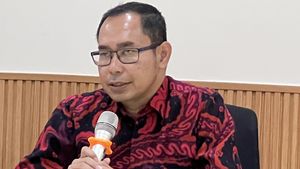JAKARTA - Director General of Village Administration of the Ministry of Home Affairs Eko Prasetyanto Purnomo Putro said the village government was demanded to be careful in managing village funds so that the benefits could be felt by the community.
"The increasing budget allocation of village funds certainly demands the readiness of government officials and village institutions to manage well, carefully, orderly and accountable," said Eko at the opening of the Stakeholder Strengthening Meeting in the Context of Strengthening Regional Governments, Regional Government Strengthening and Village Development Program (P3PD) II 2023 in Malang, East Java reported by ANTARA, Tuesday, September 12.
Eko said the meeting was held as a strategic step to strengthen local governments in supporting the implementation of programs in the regions.
In the context of equitable development, added Eko, the central government has paid great attention to villages as evidenced by the increasing budget allocation of village funds.
It was recorded from 2015 to 2022. The total village funds allocated by the government reached IDR 468.65 trillion. Furthermore, in 2023, the government has also allocated a budget of IDR 70 trillion for the village government.
In addition to increasing the understanding of stakeholders, this activity also formulates an exit strategy policy to encourage the sustainability of post-P3PD activities.
Eko added that the government has set policies to improve community welfare and deal with poverty through equitable development by building from the outskirts by strengthening regions and villages.
Therefore, development is no longer centralized in urban areas or centralization, but must be carried out in all corners of Indonesia or decentralization.
This is in accordance with the mandate of Law Number 6 of 2014 concerning Villages, which aims to change the paradigm in developing villages so that the equitable development of cities and villages is realized.
"The great concern is expected to improve services to the village community and reduce inequality between villages and cities," he said.
SEE ALSO:
However, Eko admits that in reality there are still many villages that do not have the ability to optimally manage and utilize village funds in the form of village spending.
In fact, often village spending is not fully directed to meet the basic needs of the village community.
As a result, village funds have not been able to have a significant impact on the growth and development of productive economic activities, increase public services, and fulfill the basic needs of the community at the village level.
"This situation will certainly encourage productive workers in rural areas to look for jobs in urban areas and cause villages to lack productive workforce to manage the potential or resources in villages," he said.
The English, Chinese, Japanese, Arabic, and French versions are automatically generated by the AI. So there may still be inaccuracies in translating, please always see Indonesian as our main language. (system supported by DigitalSiber.id)


















